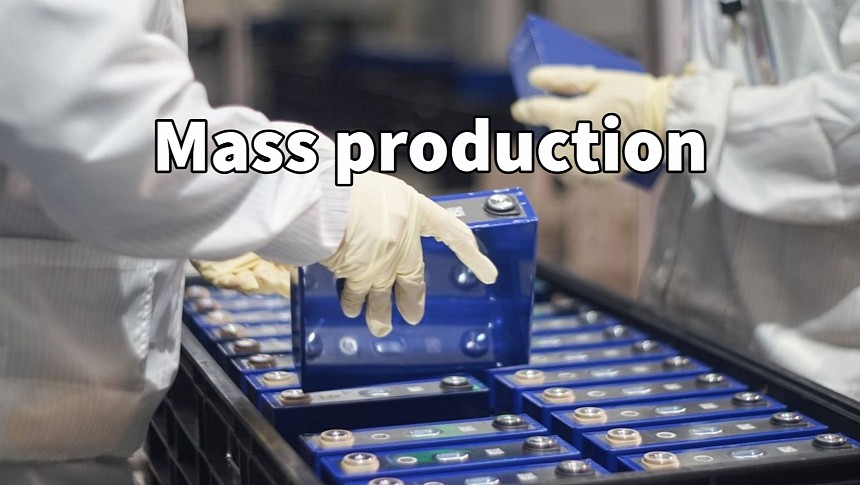Solid-state batteries promise to surpass their liquid-electrolyte variants in energy density, safety, and durability, but the technology still needs improvements. Chinese battery manufacturer Ganfeng claims it cleared the hurdles and started the mass production of its first generation solid-state battery.
Solid-state electrolytes are considered the holy grail of Li-ion batteries, allowing unprecedented energy density, durability, and safety. The technology replacing liquid electrolytes with solid equivalents has already migrated from the university labs into the startup companies' research centers. It's been there for a while, though, with very little progress to show, which made many people lose patience. But just because there's no breakthrough doesn't mean there's no progress.
The most critical issue with solid-state batteries is dendrite formation and propagation. Because the electrolyte is solid, it is prone to cracks caused by the electrodes expanding and contracting when the battery is charged and discharged. Dendrites penetrate these cracks, eventually growing between the electrodes and causing them to short-circuit. Only recently scientists discovered what's causing this phenomenon and how it can be mitigated.
Although little known outside China, battery manufacturer Ganfeng claims it has solved most of the issues with solid-state batteries and started mass production of its first-generation solid-state battery. The performance of these cells is not such a big step up compared to liquid Li-ion batteries, but Ganfeng is already advanced with second-generation development. The first-generation SSB is not an all-solid but a semi-solid battery with an oxide electrolyte, a graphite anode, and a solid electrolyte diaphragm.
Ganfeng announced the first generation SSBs in late 2021 and even presented an EV model powered by the new cells. At the time, it said its solid-state batteries could reach an energy density of 260 Wh/kg, in line with the commercially available Li-Ion cells. Ganfeng has a production line with a relatively small annual capacity of 4 GWh. This is enough for up to 80,000 EV battery packs per year. Still, the production is not destined for the automotive industry, as Ganfeng targets mainly energy storage applications.
Ganfeng's second-generation SSBs will use a lithium metal anode and can reach an energy density of 400 Wh/kg. If Ganfeng's right, it should meet automotive requirements regarding both safety and durability. Current liquid Li-Ion batteries have an energy density of just over 200 Wh/kg, which means Ganfeng batteries could offer almost double the range. Still, solid-state battery development is accelerating, and the big players in the battery industry might be further ahead in this game.
Recently, CATL unveiled its proprietary semi-solid-state battery technology named "condensed battery." This uses a condensed electrolyte, allowing energy densities of up to 500 Wh/kg. CATL aims for mass production in the second half of the year. In the meantime, NIO's supplier WeLion announced that its semi-solid state battery would start production this fall, with an energy density of 360 Wh/kg. The wait for SSB technology will soon be over, and we will see 600-mile EVs taking over the car market.
The most critical issue with solid-state batteries is dendrite formation and propagation. Because the electrolyte is solid, it is prone to cracks caused by the electrodes expanding and contracting when the battery is charged and discharged. Dendrites penetrate these cracks, eventually growing between the electrodes and causing them to short-circuit. Only recently scientists discovered what's causing this phenomenon and how it can be mitigated.
Although little known outside China, battery manufacturer Ganfeng claims it has solved most of the issues with solid-state batteries and started mass production of its first-generation solid-state battery. The performance of these cells is not such a big step up compared to liquid Li-ion batteries, but Ganfeng is already advanced with second-generation development. The first-generation SSB is not an all-solid but a semi-solid battery with an oxide electrolyte, a graphite anode, and a solid electrolyte diaphragm.
Ganfeng announced the first generation SSBs in late 2021 and even presented an EV model powered by the new cells. At the time, it said its solid-state batteries could reach an energy density of 260 Wh/kg, in line with the commercially available Li-Ion cells. Ganfeng has a production line with a relatively small annual capacity of 4 GWh. This is enough for up to 80,000 EV battery packs per year. Still, the production is not destined for the automotive industry, as Ganfeng targets mainly energy storage applications.
Ganfeng's second-generation SSBs will use a lithium metal anode and can reach an energy density of 400 Wh/kg. If Ganfeng's right, it should meet automotive requirements regarding both safety and durability. Current liquid Li-Ion batteries have an energy density of just over 200 Wh/kg, which means Ganfeng batteries could offer almost double the range. Still, solid-state battery development is accelerating, and the big players in the battery industry might be further ahead in this game.
Recently, CATL unveiled its proprietary semi-solid-state battery technology named "condensed battery." This uses a condensed electrolyte, allowing energy densities of up to 500 Wh/kg. CATL aims for mass production in the second half of the year. In the meantime, NIO's supplier WeLion announced that its semi-solid state battery would start production this fall, with an energy density of 360 Wh/kg. The wait for SSB technology will soon be over, and we will see 600-mile EVs taking over the car market.






